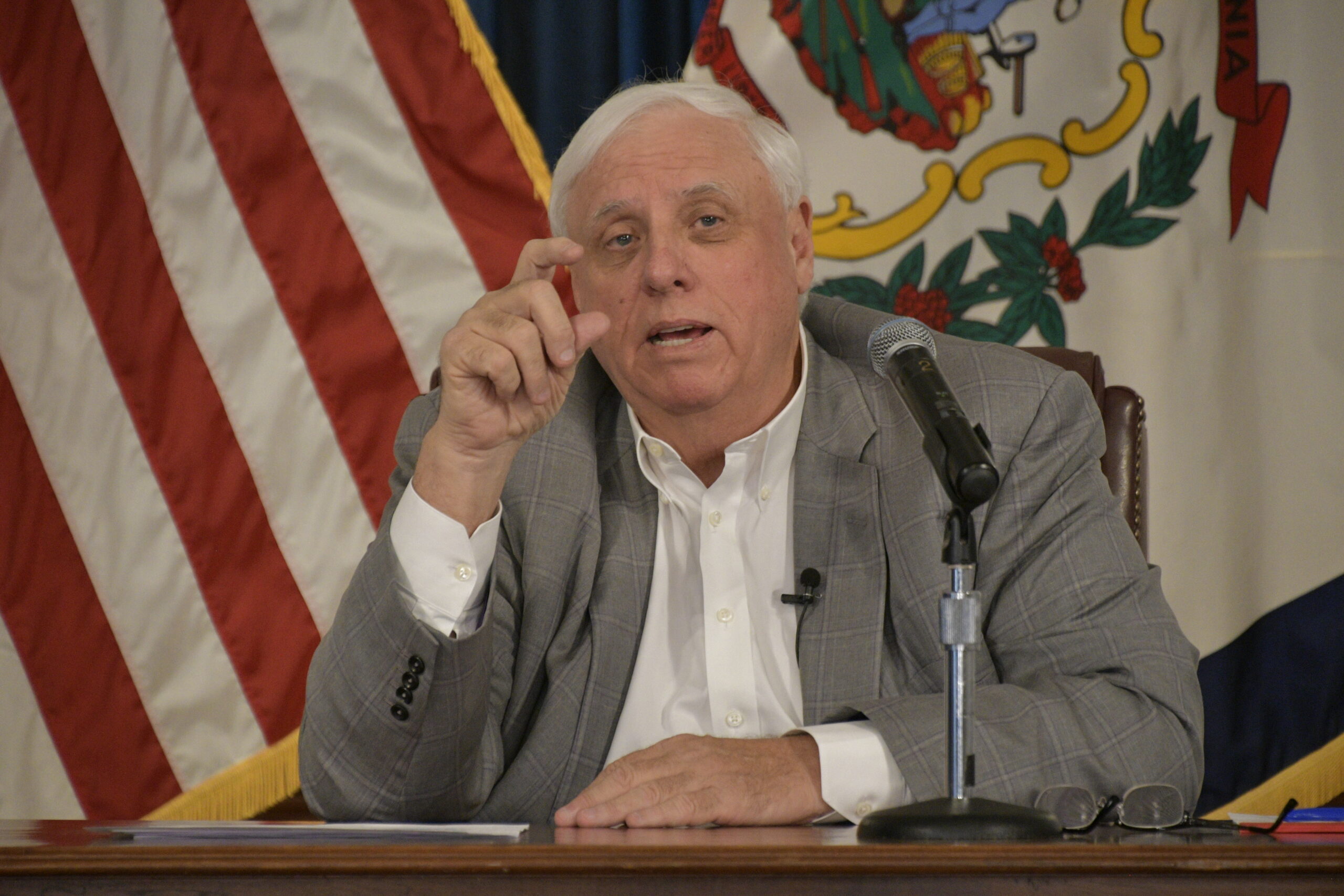MORGANTOWN — Gov. Jim Justice on Monday unveiled his plan to reopen the state, called West Virginian Strong: The Comeback.
It will be anchored, he said, to an often-reported number: the cumulative percentage of positive COVID-19 test results, which has hovered around the 4% mark since the beginning of the pandemic and the Department of Health and Human Resources’ daily reporting of test results.
“We’ve had to do phenomenally right in order to keep our numbers where we kept our numbers,” he said. “You as West Virginians really really listened to me. … You amazed the world.”
Monday morning’s numbers from the DHHR were 1,063 positive cases out of 43,039 lab results – a 2.47% percentage. The afternoon numbers were 1,077 positives out of 43,227 results, a 2.49% rate, with 37 deaths.
Justice said The Comeback will require keeping that percentage below 3% for three consecutive days. Maintaining it through the weeks ahead will require keeping it below 3%.
“The way we will win this battle is all of us running across the finish line together,” he said. The plan calls on statewide cooperation. It requires expanded testing capacity, increased hospital surge capacity as they resume elective procedures this week, ramping up the supply of PPE (personal protective equipment) and ramping up contact tracing capacity.
As The Comeback unfolds, he said, residents should continue social distancing (the plan calls it physical distancing), wearing masks when social distancing isn’t possible, continue to follow the stay-at-home order, follow county health regulations and telework when possible.
Businesses will be allowed, but not required to reopen, he said. If they don’t feel comfortable they don’t have to.
During Week 1, which is this week, hospitals will resume elective procedures – a measure that will being11,000 people back to work, he said. Daycare staff testing will begin. Other outpatient health care will resume, pending appropriate boards developing criteria: primary care, dentistry, physical and occupational therapy, mental health care.
In Week 2, small businesses with less than 10 employees can consider reopening. Professional services – such as hair and nail care and pet grooming – can resume, with customers waiting outside in their cars and wearing masks during their service, and staff wearing masks and gloves. Justice said the state will supply the PPE.
Also during Week 2, churches and funeral homes will be open to limited gatherings subject to social distancing, with attendees seated in every other pew or row and wearing masks. Outdoor dining can resume with proper sanitizing, distancing and PPE for the staff.
Over the course of Weeks 3 to 6, more areas will reopen, with a week’s notice announced by the state: office and government buildings, specialty retail stores, parks and park restrooms and facilities, gys and fitness centers, dine-in restaurants, hotels, casinos, spas, massage parlors and other businesses.
The plan provides no timeline to reopen nursing homes to visitors or to reopen entertainment venues, sporting events, concerts or gatherings of more than 25 people.
Conditions that would slow, stop or reverse The Comeback include and unexpected increase in COVID-19 hospitalizations, significant community-spread outbreaks, or that percentage surging above 3%.
The plan, Justice said, will “give you the right to show off again how good you really are. … We’re going to monitor, we’re going to watch and take small steps.”
COVID-19 Czar Clay Marsh talked about the various numbers used to track the virus. It’s still around, but West Virginian is tracking in the right direction. “I feel comfortable we’re ready,” he said. “I feel we’re in good shape to initiate this plan.”
It’s been said repeatedly that we’re awaiting drugs to treat the virus and, ultimately, a vaccine. In light of that and The Comeback plan, The Dominion Post asked if we’re looking at wearing masks and gloves and practicing social distancing for months to come, or even into next year.
Justice said it will be “months to come.” We will continue to have to physical distancing and keep watching and protecting the elderly, and doing all the things to lessen exposure.
“In the next few months,we’re just trying to buy us more time,” he said. As the cardiology chief at John Hopkins told him, “We need need a drug that will diminish this from life-threatening to a common cold. … Then we can surely move more forward. … And that drug will bridge us to a vaccine.”
In answer to another question, Justice noted that reopening will rely largely on the honor system, the state doesn’t have the resources to go into every business to see if it’s complying; but residents can notify their county health department or, if that fails, the state regarding any concerns they observe.
The Dominion Post also asked about the status of antibody testing for immunity, an often-discussed topic.
Bureau of Public Health Commissioner Cathy Slemp said, “There is currently really not super-reliable antibody testing capacity widely commercially available, but it’s well under way in development.” It’s being worked on in-state and elsewhere and will be important over the summer to understand who’s had it and who’s potentially protected from it.
On the topic of testing at nursing homes, Slemp said all 37 labs that contract with the state for testing now can report electronically. DHHR Secretary Bill Crouch said they’re close to 80% complete on nursing home testing, with 64% of those results back. Testing should be complete by Friday at the latest and all results should be in by the end of next week.
The remaining challenge is getting results to the facilities in a timely manner, he said. Facilities need 24 hours to inform all the necessary people before the results go public.
Justice ended Monday’s briefing, as he usually does, with some cheerleading. “We’re wining this thing. … We’ve go to keep going and keep winning. … Let’s go, right now. I’m proud of you.”
Tweet David Beard @dbeardtdp Email dbeard@dominionpost.com




